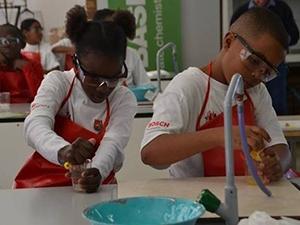
SAP Africa, through its innovation platform SAP Next-Gen, has partnered with two German International Schools to introduce coding and IOT workshops to learners as its biennial Science Week initiative.
National Science Week, an initiative of the Department of Science and Technology, is a countrywide celebration of science involving various stakeholders and/or role players conducting science-based activities. It is run in all nine provinces simultaneously at multiple sites per province.
SAP Africa's Science Week initiative, which started last week, aims to create awareness of science and technology in a fun, exciting and hands-on learning environment for learners between kindergarten and grade 12.
The workshops, consisting of 20 sessions related to science, technology, engineering and mathematics (STEM), are currently being held at the Deutsche Internationale Schule Pretoria and the Deutsche Internationale Schule Johannesburg. They are facilitated by SAP Next-Gen in collaboration with youth facilitators from Sci-Enza (University of Pretoria science centre).
SAP Next-Gen is an innovation community that enables corporates, governments and NGOs to connect with students, academic thought leaders and researchers to embrace collaboration and innovate with purpose to help the world run better and improve people's lives.
Kwena Mabotja, Africa regional director for SAP Next-Gen, says the initiative will focus on three key skills areas.
"We are introducing learners to coding via hands-on Scratch sessions; conducting design thinking sessions to equip them with tools and techniques that can be applied in any problem-solving scenario; and exposing them to the new world of exponential technologies through an IOT demo.
"As an active and engaged corporate citizen, SAP Africa is proud to support initiatives aimed at directly addressing the key issue of skills development among African youth and we look forward to seeing the programme grow over the coming years."
The ICT initiative was created in 2016 by the German International Schools in Pretoria and Johannesburg to plant the seed of curiosity in children, expose learners to a world of science and technology that is not available in schools, says SAP.
Thousands of learners from surrounding schools have been visiting the two schools since the beginning of Science Week on 29 May.
Gauteng schools that participated include Norridge Park Primary, Fred Magardie Primary, Sikhanyisele Primary, Sindawonye Primary, Koos Matli Primary, Pula Difate Primary, Boikgantsho Primary, Makgatho Primary, Laezonia Primary, Seshegong Secondary, Bokgoni Secondary, Kgabo Primary, Motsweding Primary, Mahlahle Primary, Moetapele Primary, and Nka Thuto Primary.
"The future of work is uncertain. Every day we see new disruptors enter the workplace, radically changing, and in some cases completely replacing entire job functions, industries and disciplines.
"We need to come together and foster collaboration between schools, NGOs, government and the private sector to instil the skills in our youth today that will prepare them for the future.
"Without that we will not overcome prevailing global challenges and achieve noble ambitions set out in the UN Sustainable Development Goals by 2030," notes Mehmood Khan, COO at SAP Africa.
According to the Quarterly Labour Force Survey by Statistics SA, of the 10.3 million young South Africans aged 15 to 24 years, about 30% were not in employment, education or training. This equates to more than three million young people who cannot find work because they are regarded as too unskilled and inexperienced by prospective employers.
The 2016 ICT skills survey by the Centre for Software Engineering found that there is an increasing demand for skilled labour in the local ICT sector, with the skills gap expected to get worse in the medium to long-term.
Share